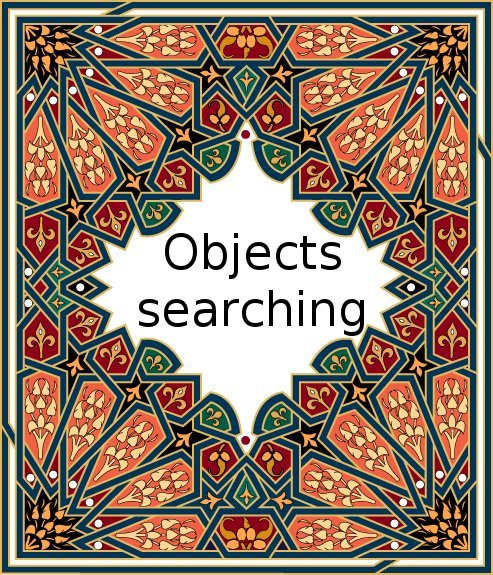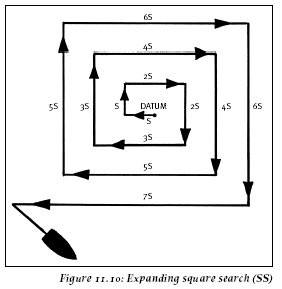|
|
||
|
searching |
 |
Fravia's |
How to find lost objects
Introduction (where the hell did I forget it?) •• "Objects searching": general advice •• Further tricks
Ok, our searching lore main aim is of course to explain web searching techniques and strategies, but I'm confident that a short "basic searching principles" tutorial, useful (hopefully) in order to find all that stuff that somehow "goes amiss", will show how some sound searching techniques can be applied, mutatis mutandis, to the physical world as well.
The following advice are intended mostly for your average PHYSICAL OBJECTS searching. "Search and rescue" operations for humans (or pets) follow different rules.
Also, if you embark in a web searching project, be aware that both longterm searching techniques and tips and advice for shortterm searching will of course be quite different on our Internet netherworld.
The rest of this site covers anyway all possible Internet searching techniques; here we'll deal instead with that fastidious pen and that pesky ring you cannot find anymore.
This said, some of the techniques explained here can be used for any kind of search. Besides, seekers should be master finders überall, not only in our web-netherworld :-)
(banal but effective approaches) |
'ts just that YOU forgot where you did put it
-
MAKE SURE YOUR MATES/KIDS/BELOVED ONE DIDN'T PINCH THE MISSING ITEM
Yep. It makes sense to search for your missing target only if and once you'r positive nobody else took it. Especially -but not only- if you don't live alone. Ask first around! Ask your relatives, your janitors, your servants and cleaning ladies, your jail-mates or wardens. -
WHERE SHOULD YOU LOOK FIRST?
Seekers do not "plunge" into a search out of the blue. All "characteristics", both of your target and of its usual "habitat", need to be taken into account.
Consider the nature of the lost item: if your own gsm phone is missing, for instance, you prolly don't need to search at all: just ring it using another telephone.
Anyway, before even beginning, think about where you should perform your search! The object you are missing is in fact not 'missing', poor thing: it is around, somewhere, as innocent as an object can be. Most likely, you simply forgot where YOU did put it. So start from the "most probable" locations. -
LOOK FIRST WHERE THE "MISSING" TARGET SHOULD BE!
Yep. Maybe you just didn't see it first time. The lost spectacles are on your nose. The jacket that "went amiss" IS indeed inside the cupboard. That pesky lost pen is in your own (other jacket's) pocket. The "lost" money is indeed in your wallet, only misplaced. Always remember to look above eye-level. Maybe you left the keys on that high shelf.
Here ~S~ Ritz's advice about the "proper place" (where educated items should dwell): "Before even searching, don't lose your objects! If you give all your important objects a proper place where they *should* be, you should know where they are. Make a habit of putting them back at their place if they're not. Make sure the other people living at your place agree on the "home" places of certain important things". -
THEN LOOK WHERE THE "MISSING" TARGET COULD BE!
Don't forget your automobile! Most people use cars to move around in this silly society of ours, even for very short trips. Maybe your target "went amiss" there.
Small objects such as keys or wallets, or GSMs, or USB sticks, or credit cards fall easily out of our pockets and promptly "disappear" in some dark area under the seats of a car... ~S~ Ritz gave another useful advice: "add a brightly coloured key hanger to your keys"!
Of course a (working) flashlight is a sine qua non for thorough car searches.
Cars are not the only culprits: sofas and armchairs also figure among the most frequent "pockets-suck-machines". - FINALLY LOOK NOT FAR AWAY FROM WHERE THE TARGET SHOULD/COULD HAVE BEEN
Yep. The pen you are "missing" simply rolled under the telephone. The spectacles that you carelessly left on the table's marge, fell behind the table's leg. The cat pawed with gusto your "lost" ring/keys/plane reservation/heart bypass under the sofa.
The letter you cannot find any more lies quietly inside that newspaper. Your scarf is "hidden" inside your coat. Your jacket has completely covered the wallet you left on the table, nope, it has not been stolen, calm down.
Classical cases: a book "buried" behind other books on the shelf, a newspaper or magazine (or letter) inside another newspaper or magazine.
On the right the correct procedure for sailing vessels in order to expand a "man overboard" square search, starting from the "most probable position". A "search and rescue" technique. Yet you can use a similar approach when searching for a lost item, starting from the "most probable position" of your target. Use those same numbers... as centimeters.
Incidentally I discovered that if you play the easy to find and apparently now in the public domain Silent Hunter III, a tactical fairly good WWII sub-simulation, of course using wine (so that it will run better in GNU/Linux than in windows) your own navigator will suggest various "man overboard" search patterns in order to find your preys :-)
-
RECONSTRUCT YOUR OWN (MIS)DOING!
Yep. You just forgot your own past deeds. You went to the basement, and dropped your car keys on the old paints rack. Or you had to go to the toilet, lo and behold: your keys are still there. A quick kiss and short fable lecture to your son, in his bedroom, and come to think of it, your missing spectacles' case could now lay on his bed.
What were you wearing? Where did you go? When did you take your wallet out of your pocket? Think about your own movements, reconstruct your wandering until you come to the point you last "had", or "saw" your missing target. Amazingly, most of the time said target will indeed be still where you in fact did put it: you'r the suspect number one: follow yourself around.
Worst case: you had so many packets or such a hurry, or maybe the telephone was ringing... that you left your missing home keys on the entrance door, outside: if that's positive, and they disappeared, you better change your locks. Also, if you think you might have left your car's keys on your car's door, you better quickly check if your car is still parked where you left it. -
CHANGE PERSPECTIVE & USE A REMINDER
Your ring fell on the floor, a stone/marble/tiled floor with hundred colors and motives. You distinctly heard the ring impact as it fell. But your small target is almost "invisible" as long as you keep searching from above. Lay your head down and put your eyes at floor level instead: that small target may become a small mountain above the ground. Changing perspective when searching is an old and valuable seeking approach; works on the web as well, come to think of it.
A simple broom might also be helpful in such cases.
Sometime it also helps to have an identical (or as similar as possible) object in your hand: thank to this "physical reminder", the brightness and color of the target will be more evident while searching for its brethren.
Also, if you have dropped and lost sight of the first item (screw, earring or pencil), you might try to drop now a second one, but this time watching attentively where it goes. That will give you an estimated radius for how far the first object rolled or bounced. This trick almost never fails to help locate the original object.
Modifying the lighting can also come handy, as ~S~ dq pointed out: "Change the lighting! Usually, when trying to fetch a fallen screw from that marble floor, I dim the lighting from above (switch it off, close the blinds, whatever) and use a torch/flashlight very close to the floor. Works like magic!" -
NOPE, THEN LET'S PERFORM A THOROUGH SEARCH
A "thorough" search is the "ultima ratio indagatoris", but s'il le faut...
If you'r sure the target IS in your house, start from the "most probable" room. Be thorough, be fastidiously methodical. Open all drawers/cupboards, look systematically everywhere.
Move furniture if needs be. Above all, make sure that once the examination is finished, IT IS really and indeed finished: the target object is positively not in the room you just so thoroughly examined.
So move to the "next probable" room... repeat until your target is found. There's no way your target can escape a thorough search. But this tiring, "brute force" method should only be used if all the previous techniques have failed. -
DON'T FORGET OLE BORGES
Seekers should keep in mind the alarming fact that lost objects change nature and produce brethren (hrönir) which, once found, are just "slightly different" from the still (apparently) missing original. Also any object (hrön) lost more than once becomes quite aberrant and nasty. So be always a tag careful with "what" you find :-)
- MNEMONICS - 1
Not lost, but "forgotten" items might be a severe pain as well. To the rescue!
Just sing! Sing whenever you leave your place: "Keys, wallet, mobile phone".
Already James Joyce, in Ulysses, wrote about performing an useful sign of the cross around your torso: "spectacles, testicles, wallet, and watch"... blasphemy makes great mnemonics :-) - MNEMONICS - 2
If you have to wear an ID badge at work, then clip it to the keys and wrap its lanyard around your wallet and phone. If you don't have to wear an ID badge, wrap instead your USB stick's short lane. This kind of pre-wrapping "packaging" makes sure you won't forget jack, and beats the "reciting a mantra" trick above. - PREPARE FOR THE WORST
Yes, you will soon or later indeed lose your wallet. And yes, you will indeed badly need ALL those credit cards numbers and ALL those documents numbers. A simple solution is to photocopy (or scan and save) front and back of all your cards and documents. Make sure you keep the copy and/or the saved scan in a place/folder you will remember, though.

Tlön, Uqbar, Orbis Tertius
"In the most ancient regions of Tlön, the duplication of lost objects is not infrequent. Two persons look for a pencil; the first finds it and says nothing; the second finds a second pencil, no less real, but closer to his expectations. These secondary objects are called hrönir and are, though awkward in form, somewhat longer. Until recently, the hrönir were the accidental products of distraction and forgetfulness [...] Curiously, the hrönir of second and third degree - the hrönir derived from another hrön, and those derived from the hrön of a hrön - exaggerate the aberrations of the initial one; those of fifth degree are almost uniform; those of ninth degree become confused with those of the second; in those of the eleventh there is a purity of line not found in the original.
The process is cyclical: the hrön of the twelfth degree begins to fall off in quality. Stranger and more pure than any hrön is, at times, the ur: an object produced through suggestion, educed by hope."